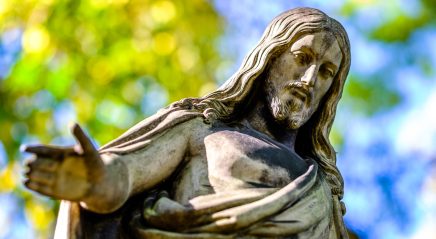Lectionary for Nov. 5, 2023
23rd Sunday after Pentecost
Micah 3:5-12; Psalm 43;
1 Thessalonians 2:9-13; Matthew 23:1-12
My Bible study group just began studying the book of James. Martin Luther famously referred to James as the “Epistle of Straw” and sought to remove it from academic school curricula, if not from the canon. Finding insufficient direct mentions of Christ, he opined that James’ letter might have been an attempt by an unconverted Jew to undermine the notion of salvation by faith alone, which Luther understood Paul to advocate. Modern scholars—Lutheran and otherwise—see deep continuities between James and the other books of the Old and New Testaments, while honoring the unique witness of James.
One of the continuities is in the warnings for teachers and those in authority to exercise their positions with humility, integrity and compassion. James says: “Not many of you should become teachers, my brothers and sisters, for you know that we who teach will be judged with greater strictness” (3:1). The prophets and the Gospels testify to the importance of selecting teachers with humility and integrity.
The prophet Micah spoke in the eighth century, warning of the impending conquests of the Northern Kingdom of Israel and of the Southern Kingdom of Judah. Largely his warnings seem to have fallen on unreceptive ears. False prophets offered a more popular message that sought to undermine the words of God spoken through Micah: “Everything is fine, and we are blessed and highly favored. We don’t need to change anything because God loves us and chose us.” They were, of course, wrong. Favor without expectation isn’t how God works at all.
Micah offered a scathing critique of this teaching and directly challenged those who taught it. He saw the teachers and prophets who offered comfort and affirmation without challenge or repentance as grasping about in the darkness. The sun, he said, would go down on such prophets, who would be put to shame for their lack of ability to see any visions (3:6-7).
These false prophets and teachers affirmed the work of civil leaders who were “making Judah great again” with building projects and expansionist language. But those projects were funded by taking property from the poor and failing to support those at the margins. Micah insisted that such leaders hate justice and twist everything that is straight while building up Zion with bloodshed and Jerusalem through malice (3:9-10; 2:1-3).
The prophets and teachers should have known that God cares much more about justice for the poor and oppressed than about buildings and the state’s financial strength. Instead, a religious-industrial complex developed where prophets and teachers would bless the work of powerful politicians in exchange for financial kickbacks, bribes and power (5:11). Instead of condemning abuse of the poor and oppressed, these faith leaders enabled such actions by blessing the leaders and the country while insisting on God’s favor.
The voice of Micah spoke out (joined by Isaiah, Amos and Hosea) to insist that God’s Spirit wanted true teachers to speak courageously about justice. True teachers are to “call a thing what it is” (to use some of our Lutheran language) and call rebellion to God through abuse of the poor and the marginalized what it is, no matter how piously false teachers frame it.
The prophets and the Gospels testify to the importance of selecting teachers with humility and integrity.
Hundreds of years later, Jesus also spoke about the dangers of false, misleading and self-aggrandizing teachers. He insisted that his followers should listen to and do what the Pharisees and scribes taught since these teachers sat in the seats of Moses (Matthew 23:3). But Jesus’ followers should only listen to their words, not follow the example of teachers who didn’t practice what they preached. (We must say, at this point, that Jesus dined with Pharisees on multiple occasions and counted several of them as his followers—marking Jesus as at least congruent to the Pharisees in their opinion. We should not read Jesus’ language here as totalizing condemnation of Pharisees. He seems to have been quite comfortable and welcome in several Pharisaical communities.)
The problems Jesus saw in some Pharisees were twofold:
- They didn’t offer their disciples help in fulfilling their own sometimes difficult teachings.
- They liked to draw distinctions between themselves and common folk, especially by their address and dress.
First, any good teacher knows that in good pedagogy you introduce a concept and then support your student as they integrate it into their world, e.g., you teach multiplication and then you practice multiplying numbers in different contexts and applications—“if Sharayah wants to make sure that each of her 12 congregants can have three pieces of communion bread .…” It seems that some Pharisees were introducing rules and then adding additional layers of guilt and condemnation when they weren’t immediately followed perfectly. If we are honest, we can see this lack of grace when new sensibilities seek to quickly displace older ones in some of our congregations.
Second, Jesus roundly critiqued those teachers and leaders who sought to distance themselves from the average person by making their religious garments especially flashy or distinctive. While every Jewish male was expected to wear tefillin and tzitzit, at least occasionally, some of the Pharisees made sure that everyone could see them wearing the religious and culturally distinctive dress at all times by enlarging their garments. Jesus’ strongest critique was for those who insisted on religious and academic titles and honors. He insisted that teachers and leaders not sit in special, reserved seats or use the titles rabbi, father, teacher/doctor, specifically because they promote a hierarchy that should not be present among siblings in Christ (6-10). While reflecting on this passage, I have come to especially appreciate my experiences in Black churches in which Jesus’ instructions here are put into practice and everyone is addressed as “Brother so-and-so” or “Sister such-and-such.” I would like to embody such practice.
In this week’s passages, Micah and Jesus warn teachers about the dangers of their office. Collaborating with power to pervert justice; teaching concepts without supporting learners in their journeys; and drawing distinctions between teachers and laypeople are all potential pitfalls. The church needs leaders and teachers, to be sure. Leaders and teachers should not chase after honor or get cozy with injustice. Instead, the church needs leaders and teachers who emulate Jesus in his humble and loving leadership.









